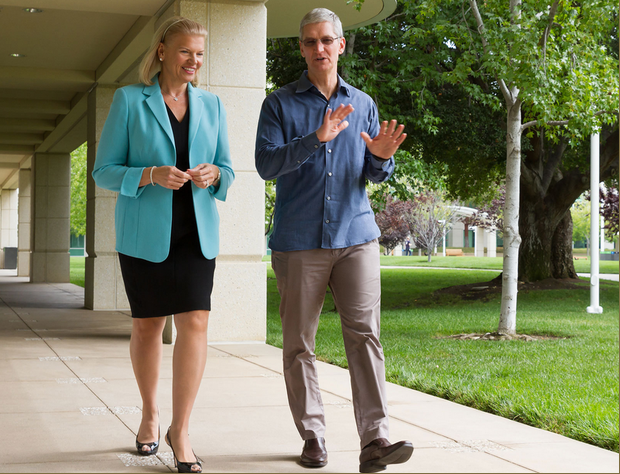Biggest losers (and winner) in Apple-IBM enterprise alliance


Tim Cook of Apple and Ginni Rometty of IBM jointly announced an alliance aiming to put Apple mobile products with IBM software into the enterprise. IBM will develop apps aimed at vertical markets on iPads and iPhones and sell them to its enterprise customers.
This is significant, as it positions Apple to increase its penetration into the enterprise. This is a focus for Apple, as evidenced by using the term "penetration" several times during the announcement. Apple is obviously planning to have iOS become a serious player in the enterprise with this alliance.
ZDNet's Larry Dignan penned an excellent overview detailing the alliance and its likely ramifications. He lists the companies that should be hit the hardest with IBM and Apple working together to get mobile products into the workplace.
IBM bringing iPads in numbers to the cubicle will hit Microsoft and its Surface effort hard.
My take on the biggest losers with this major alliance is a little different from Dignan's. My view looks at both the companies I believe will be hit hardest by this venture, along with fledgling tech that companies are trying to get into the mobile market.
Samsung: While others feel that Android will be hit hard, I find that hard to define. "Android" isn't a business entity, nor a cohesive association. Samsung is the biggest loser on the Android front, by far.
Samsung pretty much is Android from a numbers perspective, and it has both smartphones and tablets like Apple. It's been trying to wedge the corporate door open for a while with its Knox device management and security software.
The Apple/IBM alliance will directly compete with the effort by Samsung, and may knock the Korean firm out of the cubicle.
Android Wear: Before the announcement, I could see a potential market in the enterprise for wearables appearing as a result of Google's Android Wear initiative. That flew out the window with Apple and iBM cozying up together.
Read this
I don't believe that wearables are on either Apple's or IBM's radars, and with Android getting shut out of the enterprise as I think will happen, Android Wear will also find the revolving door shut. A vulnerability of Android Wear is the need for Android devices to propel it forward, and if IBM and Apple are successful in worming into the corporate world Android Wear is effectively shut down in the enterprise.
Microsoft: The company in Redmond is firmly ingrained in the enterprise, and that's not going to change any time soon. Microsoft is not invulnerable on the mobile side, however, and that's where it may be impacted with the new alliance of its competitors.
The big push for the Surface tablet, while sort of appealing to consumers, is also looking to get them in the enterprise. That's Microsoft's biggest strength so it makes sense.
IBM bringing iPads in numbers to the cubicle will hit Microsoft and its Surface effort hard. Every iPad used in the corporate world will be one less Surface tablet that might have been there instead. This could have a big impact on Microsoft's fledgling PC business.
Pen input: Tablets that use pens for input have not been popular in the enterprise. While some vertical markets have adopted them for various reasons, most companies have avoided the pen.
Microsoft has been trying to change that with the Surface Pro 3, with ads showing how good pen input can be. I happen to agree with that, but the vast majority of workers don't. Even when a company has deployed tablets with pens in the past, many tell me they stopped when they realized workers don't use the pens.
That was already a hurdle for Microsoft and penetration of the enterprise with the Surface. It won't help when IBM starts developing apps for the iPad that are optimized for touch input, even if a pen would be better.
Workers don't like to use a pen, and once specific work apps are fully optimized to do without, the pen is history. This will hit Microsoft hard with not only the Surface, but with Windows 8.1.
Biggest winner
Tech Pro Research
Some feel that Apple is the biggest winner in the alliance with IBM. It is certainly a coup, no question. As impactful as the deal will likely be for Apple, I think the corporate world is the big winner.
Having an option to go with iPads sporting IBM software will make it easier for companies to go mobile. That is the biggest tech segment by far and having an option to do it properly is a big deal.
The ability to deploy the iPad in volume should have cost reductions over conventional PCs given the industrial-strength AppleCare that will be in place. Apple's hardware support has a reputation as a very good service. Bringing it to the enterprise will shake things up.
While the enterprise is a big winner with the new alliance, consumers may benefit too. BYOD programs should get better, and perhaps even increase in number given the iPad and IBM connection. There's no word if products from the joint venture will be enterprise only, or if companies might offer purchase options to workers for BYOD.